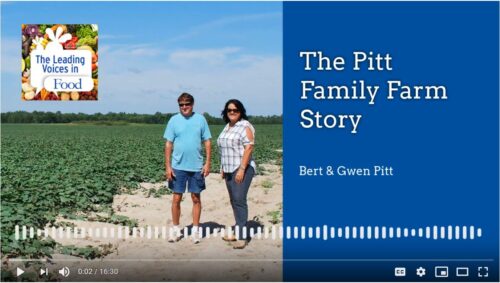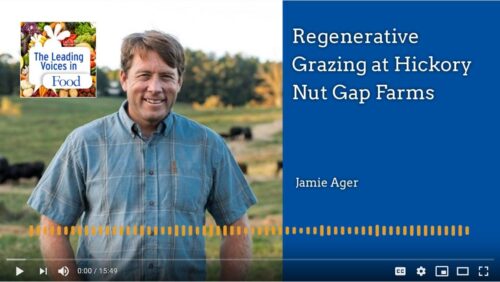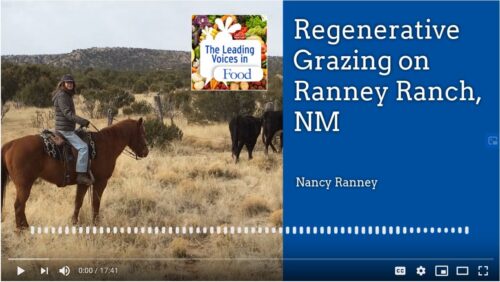Podcast Topic: Voice of Farming
The Leading Voices in Food
Podcast Topic: Voice of Farming
 E52: Hogs and Hurricanes in North Carolina
E52: Hogs and Hurricanes in North Carolina
October 7, 2019
We’re talking today with Bob Ivey and his daughter, Marlowe Vaughan, owners of Razorback Farms in Goldsboro where they raise pigs as a contractor for Maxwell Farms. Ivey and Vaughan closely follow the news, debates, and lawsuits over pig manure lagoons, odors, and water safety concerns, and they welcomed the opportunity to talk about their own farm operations, and they believe in the value of open communications.
Related podcasts: Agriculture & Tech | Food Waste & Implications | North Carolina | Voice of Farming |
 E50: Gwen’s Cotton
E50: Gwen’s Cotton
October 2, 2019
Today we’re talking with Gwen Pitt at the Pitt Family Farm located in Macclesfield, North Carolina, a rural city in Edgecombe County with a population of just 477 people. Gwen is the scout at the Pitt Farm. She scours cotton and sweet potato fields on the 1100 acres she farms with Burt Pitt, her husband of 40 years, looking for insects and testing the soil.
Related podcasts: Agriculture & Tech | North Carolina | Voice of Farming |
 E49: Pitt Family Farm Story
E49: Pitt Family Farm Story
September 26, 2019
More than 90% of farms in the US are small or family owned and operated businesses. These farms play a vital role in our economy and help to maintain rural populations. But small farms face many challenges, including encroaching urban development, dramatically changing weather patterns, young people moving to urban areas for work, low commodities pricing, and farm financing. What’s more, our farming core is aging. The average age of farmers in the US today is 58. Today we share the story of Bert and Gwen Pitt, seventh generation farmers in Edgecombe County, North Carolina.
Related podcasts: Agriculture & Tech | North Carolina | Voice of Farming |
 E47: Hickory Nut Gap Farm’s Jamie Ager on Regenerative Grazing
E47: Hickory Nut Gap Farm’s Jamie Ager on Regenerative Grazing
September 22, 2019
Jamie and Amy Ager, and their extended family, co-own the Hickory Nut Gap Farm business, and the brand Hickory Nut Gap Meats. Both are graduates of Warren Wilson College, and the couple took over running the farm in 2006 with a vision to achieve environmental sustainability through regenerative grazing. What began as a dream is now a thriving business built on relationships, environmental stewardship, and no small amount of courage.
Related podcasts: Agriculture & Tech | North Carolina | Regenerative Agriculture | Voice of Farming |
 E28: Nancy Ranney on Regenerative Grazing in New Mexico
E28: Nancy Ranney on Regenerative Grazing in New Mexico
April 26, 2019
If you’re like me, you’ve read or heard of reports and news accounts talking about the negative consequences of producing beef, with greenhouse gas emissions, heavy water use and the welfare of the animals leading the list of concerns. But just when it seems like producing and consuming less beef might be a health and environmental bonanza, along comes an alternative way of doing things. One that uses a fundamentally different approach to things.
Related podcasts: Agriculture & Tech | Climate Change, Environment & Food | Regenerative Agriculture | Voice of Farming |
 E11: Kornegay Farms’ Kim LeQuire on the Blessings of a Life in Agriculture
E11: Kornegay Farms’ Kim LeQuire on the Blessings of a Life in Agriculture
February 7, 2019
Has the buy local food movement helped farmers and open up new markets? Is organic farming really better than conventional farming? And what does it take to run a successful farming operation? We’ll discuss these topics and more with today’s guest Kim LeQuire. Kim runs Kornegay Family Farms along with her father Danny, mother Susie and brother Dan. Kornegay Family Farms is a 5,000 acre, fourth generation farm in Johnston County, North Carolina. The Kornegay’s grow sweet potatoes, tobacco, soybeans, cotton, wheat, and peanuts. The also run four swine finishing floors.
Related podcasts: Agriculture & Tech | Community & Economic Development | North Carolina | Voice of Farming |

 E52: Hogs and Hurricanes in North Carolina
E52: Hogs and Hurricanes in North Carolina E50: Gwen’s Cotton
E50: Gwen’s Cotton E49: Pitt Family Farm Story
E49: Pitt Family Farm Story E47: Hickory Nut Gap Farm’s Jamie Ager on Regenerative Grazing
E47: Hickory Nut Gap Farm’s Jamie Ager on Regenerative Grazing E28: Nancy Ranney on Regenerative Grazing in New Mexico
E28: Nancy Ranney on Regenerative Grazing in New Mexico E11: Kornegay Farms’ Kim LeQuire on the Blessings of a Life in Agriculture
E11: Kornegay Farms’ Kim LeQuire on the Blessings of a Life in Agriculture